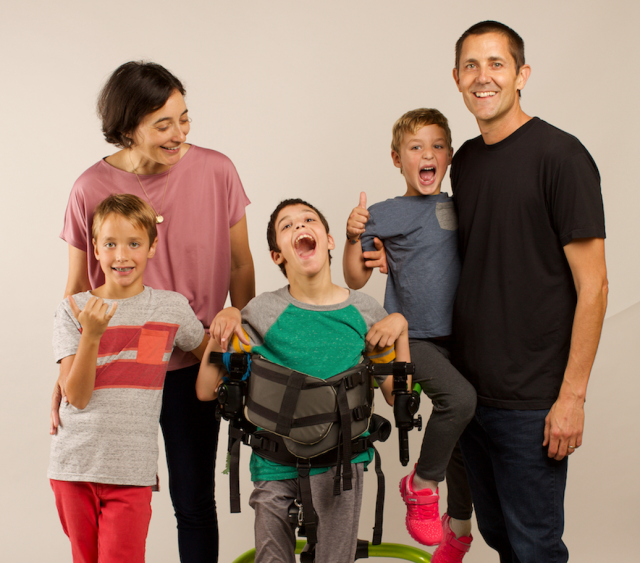This summer, I described my son, who is thirteen, as splitting his time between Billie Eilish and the L.A. Dodgers—a typical L.A., young teen existence. If you’re in the same boat, you can probably relate—except that my son, Noah, was born with a genetic condition that comes with a cascade of medical, educational and social complications.
When Noah was born, there was so much we didn’t know. There’s no road map for most of us when we learn about a child’s disability for the first time, whether it’s something that’s commonly understood, or something rare and complicated like Noah’s, which presents a lot like cerebral palsy.
Since our journey with Noah began, we’ve experienced a lot of the frustrations common to parents of young children with disabilities, along with many moments of joy. We’ve met other families and learned that we share common experiences—the fractured nature of support and resources, and the frustrating dead-ends and U-turns that come with trying to access those resources, services, reimbursement, and yes, fun, too.
Staying grounded, reaching out to the community to find other families like yours, and paying it forward when you do are all good guidance, but sometimes it’s really hard to follow that advice when you most need it. The cycles of grief that can accompany parenting a child with a disability are completely normal and necessary—that’s one of the most important things I’ve learned in my journey as a parent, and I owe most of that to Diane Simon Smith, a mother of two boys with disabilities who has practiced marriage and family therapy for more than twenty-three years.
Diane’s guidance on going through the grieving process has had a big impact on me in this season of life as Noah’s dad. As Diane told me and a group of other parents recently, it’s necessary to sit with the emotion that comes with grief. Then, when we’re ready, try to picture a landscape that incorporates that emotion and start building a new future, one brick at a time.
Noah is now at the age when it’s time to start preparing for his Bar Mitzvah celebration. Thinking about how different it will be for him and our family has triggered a whole new cycle of grief for me, and served as yet another reminder that so many things aren’t typical for Noah. He won’t have the kind of ceremony that his mother and uncle did when they turned thirteen. Sadness overwhelms me every time I think about that. So I do my best to sit with the emotion. Then, taking Diane’s advice, I think about all that’s possible in building a Bar Mitzvah with Noah that’s not typical. And with that first brick, I see a future that fills me with joy.
As we engage with the Rabbi, Noah, and his family to prepare for Noah’s big day, we’ve all been reminded of the core purpose of this ceremony. The essential idea is to establish that Noah is ready to be a part of the community, and the community is ready to receive him as a fully-fledged member. Typically, the person does intensive studying in preparation to perform a Torah reading during the service. But we are taking a not-so-typical approach so that Noah can bring his whole self to the service through his strengths and loves. As with everything in Noah’s life, music will be everywhere. We are still working on which Billie Eilish song is most appropriate based on his portion of the Torah, but he will be rocking his eye-gaze device to let us know. And in doing so, he is opening the eyes of his family, his Rabbi, and the broader congregation to a new way of seeing this rite of passage. One that doesn’t feel rote, and reinvigorates a sense of a person’s responsibility to his community and the community to him.
Learning from experts, other families that share our experiences, and our children helps us as parents to not only cope, but heal and thrive. That’s one of the biggest motivators for me when it comes to supporting other families raising kids with disabilities—the idea that we can accomplish so much more when we work together.











